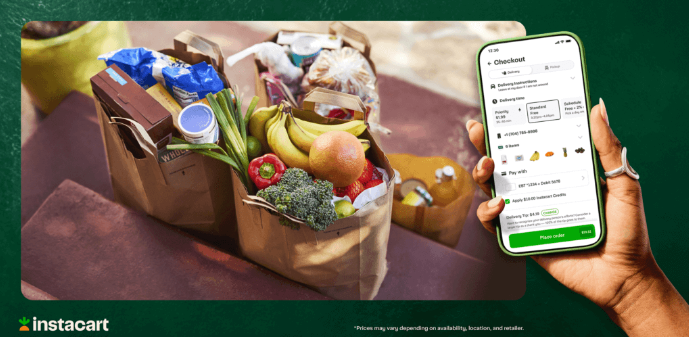Food City, Gordon Food Service, Hy-Vee, Schnucks, and Kroger banners are working with Instacart to provide SNAP benefits for online shoppers at their stores. Instacart also announced Monday that it is working with five academic institutions to support research on the impacts of food as medicine interventions on health outcomes and costs for various population groups.
Retail Partnerships
In addition to the aforementioned retailers, the online grocery platform is collaborating with Baker’s, City Market, Dillons, Fred Meyer, Gerbes, Harris Teeter, King Soopers, Mariano's, Metro Market, Pick n’ Save, Smith’s, and QFC to help increase food access to SNAP families across more than 170 retail banners and more than 14,000 stores, according to Instacart.
“We’re committed to offering families access to fresh food through an accessible and affordable online shopping and delivery experience. By expanding with retailers, we’re giving SNAP families greater dignity of choice, and helping many experience–for the first time–the convenience of having groceries from these retailers delivered to their doorstep,” said Sarah Mastrorocco, VP and general manager of Instacart Health, in a statement.
Academic Partnerships
Instacart is working with historically Black college Meharry Medical College to produce a special supplemental issue of its peer-reviewed Journal of Health Care for the Poor and Underserved. The issue will focus on research related to food access, nutrition security, and associated health outcomes for individuals in historically marginalized communities, including Black and Hispanic households, urban and rural communities, and families living below the poverty line.
“It’s important to ensure the growing body of research on food as medicine elevates the full breadth of new studies being conducted and examines the impact for individuals in historically marginalized communities,” said Dr. Beatrice Abiero, senior research lead at Instacart, in a statement.
The grocery delivery service is collaborating with researchers at The Ohio State University to examine the impact of food as medicine interventions that include access to culturally relevant and home-delivered foods, tailored behavioral counseling, and social needs care coordination for Medicaid-enrolled patients with cardiovascular-kidney-metabolic syndrome.
The research team will use Instacart services to improve nutrition security, cardiovascular health, and advance health equity for study participants, according to Instacart. The services are category-specific stipends called Instacart Health Fresh Funds and medically tailored grocery shopping through the Virtual Storefront.
The online grocery platform is partnering with researchers at the Duke Clinical Research Institute and the Louisiana Public Health Institute to examine how online versus in-store grocery shopping affects food purchasing patterns, consumption patterns, and access to healthy food options among patients at risk for cardiovascular disease. The study will use Instacart Health Fresh Funds as one of the stipend models to help inform future potential nutrition incentive programs.
Instacart is working with researchers at the University of Kentucky and the University of Kentucky Food as Health Alliance to study screening, referral, and enrollment techniques for food-as-medicine programs among adults living in urban and rural communities.
Deploying the Instacart Health Fresh Funds tool, the study will focus on identifying ways to increase participant engagement, improve health outcomes, and drive cost efficiencies for food as medicine programs.
Instacart is collaborating with researchers at the University of Pennsylvania on a “choice architecture” study that will use Instacart Health Virtual Storefronts and Fresh Funds to evaluate different approaches to encourage fruit and vegetable purchases among patients with obesity and diabetes.
The study’s goal is to derive insights to shape produce prescription programs and other nutrition interventions for patients at heightened risk for atherosclerotic cardiovascular disease, noted Instacart.
“At Instacart, we believe in the power of food as medicine, and we are committed to using our unique technology and reach to support groundbreaking research on food as medicine programs,” said Sarah Fleisch, senior director of policy research & development at Instacart, in a statement. “We’re proud to partner with researchers at these leading academic institutions to uncover the evidence needed to scale food as medicine programs and ensure they reach more patients, families, and communities.”
Related: FDA, USDA Work to Improve Food System; Report: Sustainable Meat Packaging Outlook

